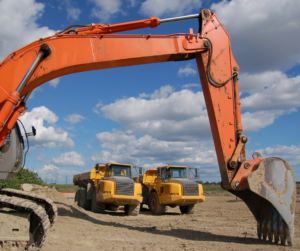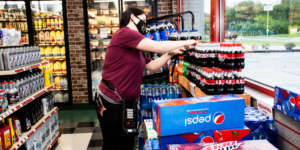![]()
Along with household C-Store industry names, private investors and entrepreneurs are tapping into the C-Store industry more than ever before as we continue to see growth and acquisitions across the country. Despite the pandemic and the drag on our economy over the last 1.5 years, C-Stores have proven their ability to be resilient and profitable, creating a dominating presence within the retail industry. Convenience Store News reported that the convenience store industry grew inside the store sales last year by 3.3 percent, which was even greater than the 2.6 percent growth produced in 2019. This leaves little room for question as to why so many people are dipping their toes into the ever-growing C-Store industry. For those new to the business and learning how to navigate their C-Store investment, one of the biggest questions is “should we build from the ground up, or buy?” While there are pros and cons to both scenarios, here are some things to consider for each option.
Breaking Ground

Convenience store construction projects have exploded over the last 3 decades, increasing the number of stores from 90,900 in 1985 to 150,274 stores to date in 2021. Private equity firms, entrepreneurs, and existing big brand industry leaders are finding the benefits of breaking ground and constructing their stores to reflect their vision. Considering all the changes we are seeing in the modern C-Store today, the opportunity to design a space conducive to foodservice trends, mobile ordering, and fresh in-store offerings, building your own brick and mortar is incredibly appealing.
What to Consider:
- Construction costs of building a C-Store. The cost to construct a convenience store has grown over the last decade, allowing for increased square footage, a rise in construction material costs, and inflation. Prepare for a large investment ranging from 2 to 7 million depending on location, square footage, materials, and labor costs.
- Energy efficiency. Due to the amount of energy required to run a C-Store, many retailers are investing in energy-efficient construction to manage long-term costs. Operating with walls of coolers and outdoor canopy lighting, 24 hours a day results in high use of energy. Including products like LED lighting and energy-efficient refrigeration systems will help curb the long-term use costs.
- Natural disaster resistance. Constructing a structure that can withstand a natural disaster and serve as a sanctuary to the community is imperative. In a dire situation, convenience stores provide much-needed fuel and food to residents as well as first responders. NACS developed a C-Store emergency planning and job aids document to help establish security and protocols when an emergency occurs.
- Floor Plan. With all the options that C-Stores currently provide their customers, the average floor plan of a store has increased significantly. What started out as a tiny 1200 square foot building selling snacks and providing a single gas pump has evolved into 5,000 square feet, offering fresh food, gourmet coffee, craft beer, and 10+ fuel pumps. Creating a space that houses all the conveniences you want to offer could increase the price of construction as well as the upkeep. However, having the exact space you want and need will help you run your operation successfully from the start.
- Location. Before drawing up plans and breaking ground, a location needs to be chosen. Picking high traffic, heavily populated, or open market area is key. According to cspdailynews, the top 10 locations for new stores are: Chicago IL, Austin TX, Columbus OH, Seattle WA, Sacramento, CA, Raleigh-Durham NC, Denver CO, Tampa FL, Nashville TN, Atlanta GA, and Houston TX. Conduct market research and visit potential locations and their surrounding areas, noting competition as well to determine the perfect spot for your C-Store.
Investing in an Existing Store or Franchise

When building from the ground up sounds overwhelming or intimidating, there is always another option: acquiring an existing store or franchise. The advantages of taking this route are many, including:
- Existing customer base
- Access to key information such as financials, foot traffic, product data
- Ability to learn from the experience of the existing owner
- No need to acquire suppliers or vendors or additional contracts
- All licenses and permits are in place
- Existing staff that are trained
However, one must consider that the reason a store is for sale is typically because it is losing money. Exploring all appropriate channels and doing your due diligence will shine a light on why the store is for sale and if the investment is worth it for you. One way of evaluating your acquisition is by using Quantum Services to conduct an audit of the store prior to purchase, to obtain a clear picture of the inventory landscape of the store. Additionally, some key questions to ask yourself and research are:
- How old is the equipment? Has it been recently inspected? Is it well maintained?
- Is the POS system up to date? Does it provide a balance sheet and track inventory? Is it secure?
- What will your customer demographic be, and do they have disposable income?
- How many vendors does the store work with? Review and agree to their contracts and terms.
- Is the store profitable or does it have the potential to be? Review financial statements and verify they are audited.
- Are all gasoline pumps up to date with their inspections?
Purchasing a Franchise
Another option is purchasing a franchise. Along with other benefits, one of the largest is having an established brand name. Parent companies will provide you with a framework and guidance as you navigate your new investment. Complete with procedures, inventory lists, and pays for national advertising and brand marketing. Some additional general points of consideration about buying a franchise are:
- Lower start-up costs
- Embedded profitability
- Increased visibility with brand
- Ongoing franchise fees
- Lack of total operational control and brand control
- Having to rely on the strength of the parent company for future growth and profit
Once the Decision is Made

When making such a large investment and weighing all the pros and cons of building versus buying, attention to detail and conducting your due diligence is vital to your success. Checking all the boxes and making sure you get what you want and need out of your expenditure, so you feel confident in your decision is necessary before signing any papers. Whether you are new to this industry or established, all variables need to be considered and all open issues need to be resolved. One of the biggest costs of building your own C-Store is building up your inventory and managing it going forward. Likewise, when purchasing an existing store and/or franchise, the acquisition inventory audit plays a particularly significant role in getting your business off the ground. Quantum Services has the expertise and experience to help you get your business going and help you to keep it growing. Specializing in C-Store–specific inventory auditing needs, our team will work diligently to help conduct your acquisition audit and help you track your store’s inventory data going forward to keep profits up. Outsourcing your inventory needs will provide you the time to focus on operations to gain customer presence and establish a well-run convenient store. Building versus buying is a big decision that is unique to every investor, and we can help you feel good about whichever decision you make and help you with your next success story. Reach out today to learn more.